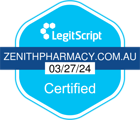Let’s get straight into it. Shopping for supplements online can be overwhelming. Between the countless options and flashy marketing claims, it’s tempting to adopt a buy-first, think-later approach. However, our suggestion would be the exact opposite. Vitamins and supplements are meant to support your health and well-being, but that also means they come with extra health risks and considerations. As with anything you put in or on your body, it’s always good to err on the cautious side, verifying safety and efficacy before making a purchase. Here are 10 things we recommend you consider before buying supplements online.
1. Check for Third-Party Testing
Third-party testing helps verify a supplement’s contents, including its active ingredients, potency, and absence of contaminants. Naturally, this plays an important role in establishing trust, but it’s not without its limitations. Not all third-party certifications are created equal, and some testing bodies have more stringent criteria than others. HASTA is recognised Australia-wide, while consumers overseas might be similar with the rigorous standards of NSF International and USP.
All things considered, supplements are complex, and third-party testing is just one layer of assurance. Our advice would be to think of third-party testing as part of a larger toolkit for assessing product quality rather than a catch-all solution. The absence of testing is certainly a red flag, but even certified products should be evaluated with the brand’s overall reputation in mind.
2. Verify Manufacturing Standards
The phrase “manufactured according to Good Manufacturing Practices (GMP)” might seem like boilerplate text, but it’s a critical indicator of a supplement’s quality. GMP-compliant facilities adhere to stringent standards for cleanliness, ingredient handling, and production consistency.
Why does this matter? Unlike prescription medications, supplements aren’t quite as tightly regulated. This increases the risk of subpar manufacturing processes that can lead to contamination, inaccurate dosages, or unstable formulations. By openly stating GMP adherence as a supplement company, you are inviting consumers to hold you accountable for your practices.
Look for brands that provide specific details about their manufacturing practices rather than vague claims. If a product listing or website avoids this topic entirely, it’s worth questioning why they aren’t being forthcoming with this information.
3. Read the Ingredient Labels
Understanding ingredient labels is a foundational skill for smart supplement shopping. Checking both the listed ingredients and their quantities can reveal whether a product aligns with your needs. It’s also an opportunity to become familiar with the tactics brands use to obscure transparency.
For instance, proprietary blends are commonly marketed as innovative formulations but often hide the exact quantities of individual ingredients. This lack of clarity can prevent you from determining if key components are present in effective amounts (or worse, if they pose risks at high levels).
When shopping online, take the time to cross-check the listed ingredients against reputable sources. Are they backed by research? Do they serve a clear purpose? Reliable product descriptions should complement the label by explaining the benefits and potential risks of each ingredient. Don’t hesitate to dig deeper into unfamiliar components, as knowledge is your best defence against misleading claims.

4. Research the Dosages
Dosage is everything when it comes to a supplement’s effectiveness. Research confirms that some ingredients must be consumed in specific amounts to deliver meaningful results. On the flip side, excessive doses can lead to adverse effects. Vitamin D (crucial for bone health) is one example where too much can cause calcium build-up in your blood, leading to kidney problems.
The best approach is to compare a product’s dosage with guidelines from clinical studies or reputable health organisations. Remember, more isn’t always better. Optimal dosing depends on your individual needs and health status. Consulting a healthcare professional can provide clarity, especially if you’re combining supplements or have pre-existing conditions.
5. Consider Your Specific Health Needs
Your choice of supplements should reflect your individual health priorities. While this may seem obvious, it’s all too easy to get drawn in by trendy products that don’t align with your personal goals or medical requirements. For example, a supplement marketed as an energy booster might not be necessary if your primary concern is managing a nutritional deficiency.
To stay on track, consider what you’re hoping to achieve. Are you looking to address a specific deficiency, support long-term wellness, or improve a particular aspect of your health?
We stock many vitamins and supplements in our pharmacy, both in-store and online. Yet we only recommend products if they are consistent with the patient’s explicit needs. Always make sure your choices are grounded in your health priorities, not marketing hype. Getting clarity from your GP is one way to do this, and our team is also available to answer questions via our contact form.
6. Buy From Reputable Online Pharmacies
We’ve spoken at length about finding reputable online pharmacies, particularly when it comes to compounding and veterinary compounding.
When buying supplements online, many of these points still stand. Look for detailed product descriptions, transparent contact details, and an active customer service team. Websites that prioritise your shopping experience will often feature clear policies on returns, refunds, and shipping. And don’t forget to read customer reviews, as well as double check that payment is safe and secure.
If you’re particularly diligent, confirm the pharmacy’s registration status. In Australia, an online pharmacy must be registered with the Pharmacy Board of Australia. You can also look for a pharmacy that has been accredited by the Quality Care Pharmacy Program (QCPP). QCPP accredited pharmacies, such as Zenith Pharmacy, meet the industry standard for providing safe, and consistent professional services.
Taking the time to investigate this information, and being wary of sites that lack these features, will go a long way towards making your online shopping experience safer and simpler.
7. Understand the Risks of Unverified Sources
Buying from unverified sources might save you a few dollars upfront, but it could cost you much more in the long run, both financially and health-wise. A growing issue in the online space is the emergence of counterfeit supplements, often containing ineffective or dangerous ingredients.
Gambling with your health and money is not recommended. Stick to trusted sellers, such as manufacturers’ official websites or authorised distributors. These platforms have a vested interest in maintaining quality control and consumer trust. When your well-being is on the line, having this peace of mind is appreciated.
8. Check for Allergens and Additives
Supplements are designed to support your health, but the ingredients they contain can sometimes complicate matters. Many commercial products include excipients like soy, gluten, dairy, or artificial colours and preservatives. These ingredients are not inherently harmful. In fact, they often serve practical purposes such as improving shelf life, texture, or taste. But when you have allergies, intolerances, or sensitivities, they start doing more harm than good.
If you’re in this boat, scrutinising product labels is essential. Look for supplements explicitly labelled as allergen-free or additive-free, and verify these claims by reviewing the ingredient list. Alternatively, it’s worth considering a compounding pharmacy, as they can customise a supplement to remove any excipients that cause an unwanted reaction.
9. Look for Sustainable Practices
Always consider the broader impact of your purchase when purchasing supplements online. Does the company use recyclable packaging? Are the ingredients ethically sourced? If these questions matter to you, it’s worth supporting brands that prioritise sustainability, as it often reflects a commitment to quality and responsibility. It also helps promote ethical practices within the industry.
Choosing sustainable supplements is one way to make a positive impact, leveraging the power we have as consumers.
10. Seek Professional Advice
We’ve preached the importance of doing your own research and being informed about the things you put in and on your body. But professional advice remains invaluable, and you should seek it whenever possible. Supplements interact differently with each individual’s body, and factors like medications, pre-existing conditions, and overall health status can influence their effects. A GP, pharmacist, or nutritionist can help you navigate these complexities.
Consulting an expert can also help you set realistic goals and provide direction for your supplement regimen. Having an approved treatment plan ensures you’re maximising benefits while avoiding potential risks.

Zenith Pharmacy – The Australian Online Pharmacy You Can Trust
If you’re in need of a trusted provider of supplements online, look no further. At Zenith Pharmacy, every product is carefully selected from reliable suppliers and meets rigorous quality standards. While we offer a wide range of options, including vitamins, immune boosters, and specialised health products, our primary focus is on your safety and satisfaction.
We’ve made it simple to browse and purchase supplements from the comfort of your home. And if you ever need guidance, our experienced pharmacists are just a call or message away, ready to provide their expertise. For high-quality supplements with fast delivery, Zenith Pharmacy has everything you need.


 Zen Xiao
Zen Xiao


